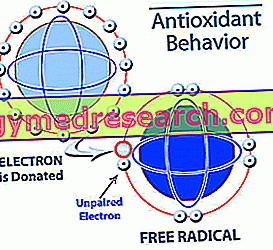Related articles: Gastric ulcer
Definition
The gastric ulcer is an erosion of the mucous membrane of the stomach, similar - so to speak - to the lesion left by a cigarette stub off on the skin. In some cases, the wound progressively worsens, going deep and reaching the submucosa and the muscular layer of the stomach. In extreme cases it can even penetrate the organ, causing bleeding and occlusion due to tissue healing.
At the origin of gastric ulcer there is an imbalance in the natural defenses of the mucous membrane of the stomach. In normal conditions, in fact, the mucus lining the internal walls of the stomach, and other defense mechanisms (eg prostaglandins, blood flow, etc.), protect the tissues from the damaging action of gastric juices, which favor the digestive process and are highly acidic. Anything that alters this barrier and hinders the natural defense processes makes the inner walls of the stomach more vulnerable to the corrosive action of gastric juices.
The main factor that undermines the ability to defend and repair gastric mucosa is Helicobacter pylori . This bacterium, in fact, undermines itself between the mucus and the gastric wall, avoiding the attack of acids and releasing a series of substances that damage the layer of mucosa.
In addition to chronic Helicobacter pylori infection, there are a number of factors that contribute to the onset of the disease; these include: incorrect eating habits, cigarette smoking, mental stress and chronic alcohol abuse. The disease can also be a consequence of gastritis or prolonged use of gastrolesive drugs (in particular, non-steroidal anti-inflammatory drugs and cortisone drugs). More rarely, instead, it is the expression of a tumor.
Most common symptoms and signs *
- Anemia
- Anorexia
- Asthenia
- Increased appetite
- Heartburn
- Bad digestion
- Stomach cramps
- Chest pain
- Pain in the Stomach Mouth
- Pain in the upper part of the abdomen
- Pain in the sternum
- Hematemesis
- Gastrointestinal hemorrhage
- heartburn
- Belching
- Feces picee
- Abdominal swelling
- Hypovolemia
- Melena
- Nausea
- Nausea and vomiting in the early stages of pregnancy
- Weight loss
- Gastrointestinal perforation
- Heaviness in the stomach
- Inflated stomach
- He retched
Further indications
The symptoms of gastric ulcer depend on the location of the lesion and the age of the patient. Characteristic is the onset of dull pain, similar to a cramp, and a sense of burning in the upper and central region of the abdomen; these symptoms typically arise shortly after eating. Postprandial pain is sometimes described as a feeling of soreness, pressure, heaviness or emptiness. Other symptoms may also appear, such as difficult digestion, nausea, vomiting, belching, abdominal swelling, lack of appetite and weight loss. In other cases, the symptoms are completely absent.
The gastric ulcer is usually chronic and recurrent, that is, it occurs with exacerbations punctuated by periods of apparent healing. The gastric ulcer can become complicated in a digestive hemorrhage, when, becoming sufficiently deep, it arrives to erode the nearby blood vessels. The possible haemorrhagic complication may be visible to the naked eye due to the emission of dark tarry faeces (melena) and the appearance of blood vomiting (hematemesis) or of caffean material. Asthenia and anemia are due to blood loss.
As we have seen, in extreme cases the lesion can even extend through the entire thickness of the stomach wall. A warning sign of organ perforation is the appearance of intense stabbing pain, similar to a sudden and persistent stab in the stomach.
The diagnosis of gastric ulcer is made by endoscopic examination, biopsies of the gastric mucosa and the simultaneous search for Helicobacter pylori infection .
The treatment of the ulcer involves the use of drugs able to reduce the acidity of the gastric juices and give the mucosa the time to regenerate. The most commonly used drugs are the classic antacids (such as aluminum hydroxide), but above all the proton pump inhibitors (omeprazole and derivatives) and the H2 antagonists (eg cimetidine and ranitidine). Against Helicobacter pylori (if present), an antibiotic therapy able to eradicate the infection is also associated. Digestive hemorrhage and perforated ulcer, on the other hand, always require immediate medical-surgical treatment.



